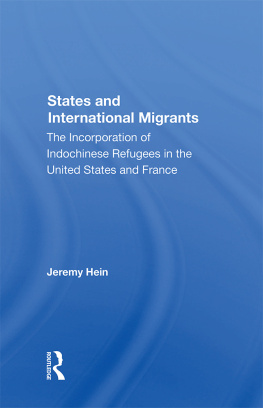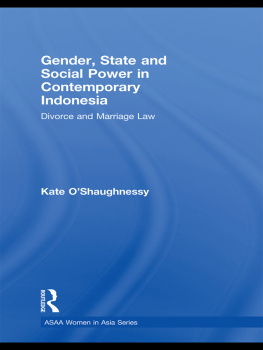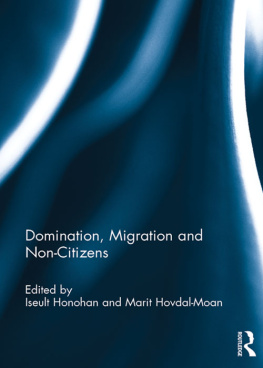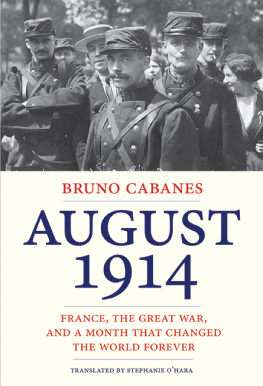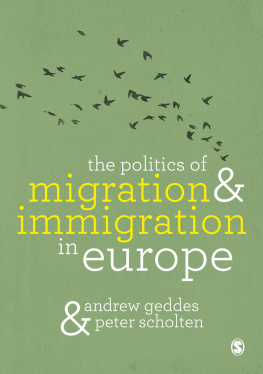Acknowledgments
It is an impossible task to thank the many friends, colleagues, and mentors who made this project possible. And yet I will endeavor to do so anyway.
My first thanks go to Philip Nord, whose intelligence and insight were indispensable to the development of this project. Phils guidance contributed immeasurably to my personal and professional development as a scholar. I am grateful that he was willing to share his wisdom with a novice to the discipline of history and to the academy, more generally. Margot Canaday offered perceptive feedback on this project as well as support, encouragement, and mentorship throughout. It was she who first introduced me to the (substantial) American literature concerning immigration as well as the study of gender and sexuality more generally. As a result, she has deeply influenced the way I think about history and, of course, the way I do history as well. Bonnie Smith asked searching and creative questions about this project from the start, which encouraged me to keep the human narrative central to the story. She is a model of brilliance, and ferocity, and I am lucky to have her as a mentor.
I had the great fortune to benefit from the advice of David Bell, who pushed me to clarify the stakes of my work. Gracious with his time and thorough in his feedback, David also offered more practical guidance on negotiating the strategic challenges of academic life. I also wish to extend a heartfelt thanks to Claire Zalc for a great many things that are too numerous to recount: it was Claire who provided key insight in the formative stages of this work, Claire who pointed me toward archival sources, Claire who vouched for me with archivists, introduced me to fellow scholars and colleagues, and helped integrate me into the intellectual life of Paris. Without Claire, I would truly have been lost during my time abroad.
Many of us find our way into the academy via an inspirational mentor. I am no different. As an undergraduate at UC Berkeley, Susanna Barrows first inspired in me a curiosity about all things French, encouraging me to pursue a graduate degree in French history and urging me to think about immigrant women in France and multiculturalism in Europe. Halfway through my graduate career, I was fortunate enough to find another historian of France who very much reminded me of Susanna: Rachel Fuchs. Both women were exceptional scholars, teachers, and mentors. Brilliant, enthusiastic, and compassionate, they modeled what it meant to be a scholar, both in the archives and in the classroom. They taught me that no woman is an island, no scholar cut off from a wider community. They also impressed on me, and all of us, the need to be compassionate with one another in order to make those relationships possible. I thank both Susanna and Rachel for these lessons as well as welcoming meand so very many othersinto their homes and hearts.
In Paris, I owe a number of debts of gratitude. From the start, Nancy Green met with me and offered helpful tips on untapped archival sources. She also suggested many references and offered kindly to look over drafts and outlines. Delphine Serre agreed to meet with an American graduate student unfamiliar with the ways of quanti. Undaunted in the face of my innumeracy, she helped me devise a sampling system to examine social worker files that made this precious source usable in the project. Evelyne Diebolt first alerted me to the existence of the Olga Spitzer Association, and without her, this project would not have come to fruition. In addition to her extensive knowledge of female-led philanthropic organizations in Paris, she was warm and inviting, and I thank her for the many kindnesses she showed me and my family while abroad.
The archives of Paris often proved formidableeven forbiddingplaces, but the help of archivists made them less so. From the quipe de naturalisations at the Archives Nationales of Paris, I thank Pascal Riviale, Brigitte Lozza, and Delphine Peschard for their tireless service each week from September 2010 to January 2012. A huge thanks goes of course to their fearless chef dquipe, Annie Poinsot, who graciously bent the rules for me from time to time so that I could make more rapid progress on my research. For their companionship and good cheer, thanks also to les jumeaux, Charles and Chantal, as well as Cedric. At the Archives Nationales in Fontainebleau, I thank Pascal Philippides for helping me to process naturalization files en gros. A special note of appreciation also goes to archivists at the Archives de la Prfecture de Police, especially Franoise Gicquel, whose benevolent intervention on behalf of this immigrant woman in Paris ensured that I could remain there, OFII notwithstanding.
At the Archives de Paris, I thank the entire staff for making the archive a convivial place in which to spend months poring over sometimes gruesome court cases. Thanks especially to Jocelyne Ha who remained undaunted by the large number of affaires judiciaires I ruthlessly asked her to examine. Without Jean-Charles Virmaux, I would never have gained access to the precious Olga Spitzer files. And without Vincent Tuchais, I never would have had anyone on the inside to vouch for me and advocate on my behalf for access to these fonds and others. Thank you all for allowing me to tell the stories that I so wanted to tell in this book.
Others along the way provided help at critical junctures in the development of this project. Thanks especially to Eliza Ferguson, Jennifer Heuer, Amelia Lyons, Paul-Andr Rosenthal, and Judith Surkis who offered useful feedback on papers and/or chapters. Thanks also to Linda Clark, Martha Howell, Mary Dewhurst Lewis, Linda Guerry, Kelsey McNiff, Clifford Rosenberg, Emmanuelle Saada, Tyler Stovall, Rosemary Wakeman, and Susan Whitney for offering pointers, suggesting sources, even sharing your archival materials with me. This work has also benefited from discussions generated at several conferences and workshops sponsored by the Institut dHistoire Moderne et Contemporaine at the Ecole Normale Suprieure; the Sciences Sociales et Immigration seminar hosted by Claire Zalc, Alexis Spire, and Choukri Hmed in Paris; the Princeton-EUI-CEU Graduate Conference on Europe and the World; the Program in Gender and Sexuality Studies Graduate Works-in-Progress Series at Princeton University; the Modern Europe Workshop at Princeton University; the Society for French Historical Studies; the Western Society for French History; and the Gender, Family, and the State Conference at Tel Aviv University.
As research for the book took me back and forth across the Atlantic, I was fortunate to tap into a community of French scholars that included Anas Albert, Claire Cage, Hannah Callaway, Muriel Cohen, Katie Jarvis, Mehemmed Mack, Katie McDonough, Carolyn Purnell, Kelly Summers, and Emmanuel Szurek, among many others. I am so fortunate to be able to call many of you not just colleagues, but friends. To Gen Creedon, Christopher Kurpiewski, Beth Lew-Williams, Dov Grohsgal, and Shannon Winstonyou may not be French historians, but your friendship has been trs magnifique. For their mentorship since my Berkeley days, I thank especially Robin Mitchell and Sarah Horowitz who readily dispensed advice and did so with the sort of generosity of spirit that would have made Susanna proud. Given my professional trajectory out of academia, the friend-torship of Danna Agmon, Richard Hopkins, Minayo Nasiali, and Christy Pichichero has been most welcome.


